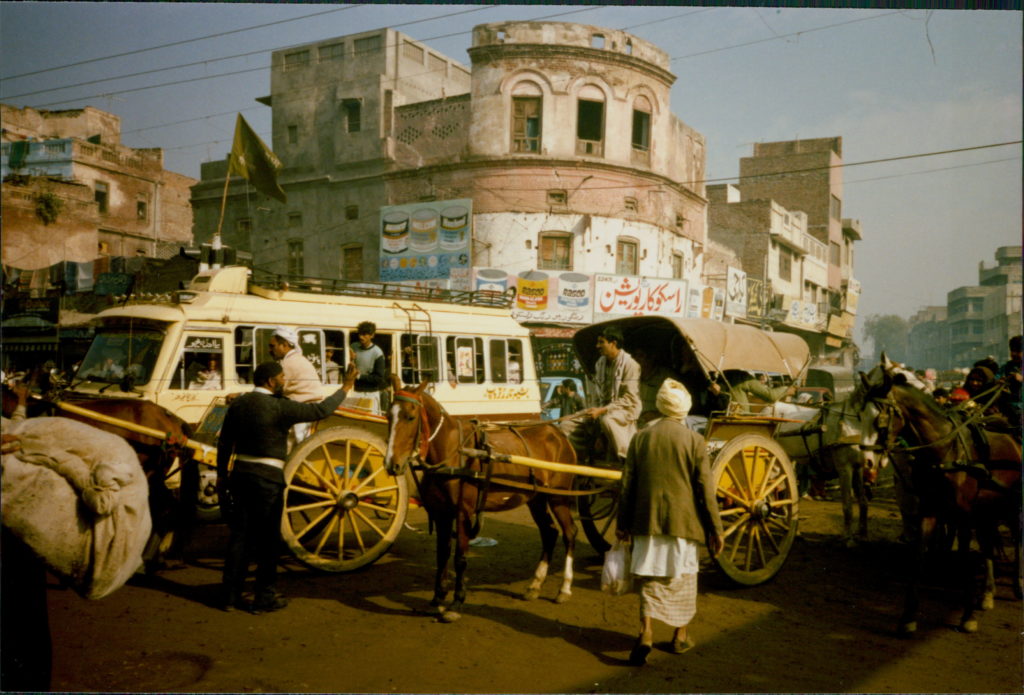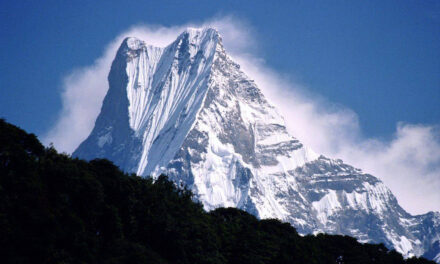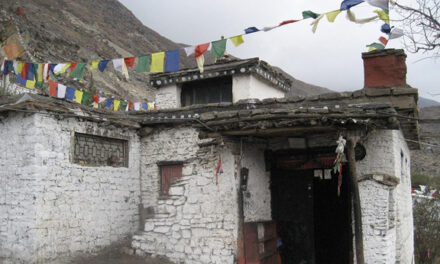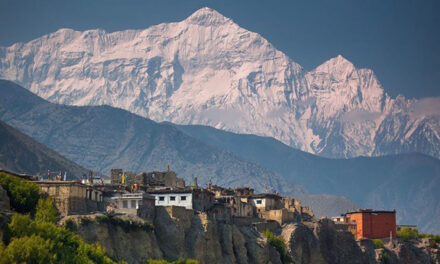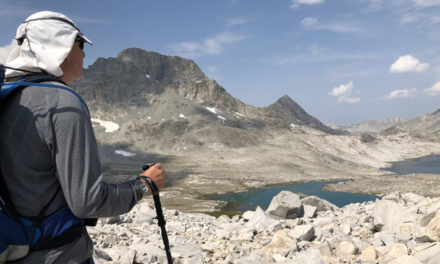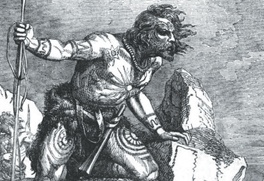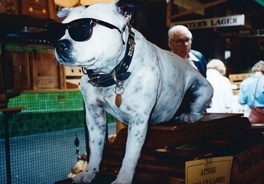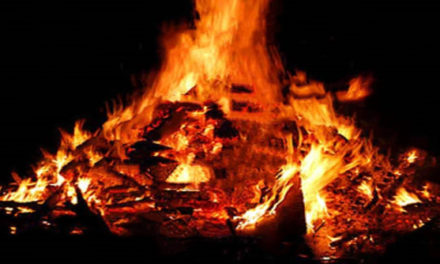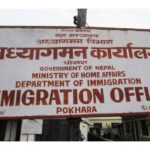“Return to your seats!” the forward flight attendant yelled over the intercom. “NOW!—please!” she added with a hint of panic.
The large entourage of travelers in the jet’s midsection ignored the admonition and, now up from their seats and swaying around in the aisle, proceeded to gather their belongings from above and below. They were on a mission that was oblivious to the fact that we were still airborne in buffeting winter breezes over northern Pakistan. Maybe they didn’t care about protocol and just wanted off this huge metal container in the sky; back to terra firma.
A second and third round of “SIT DOWN!” was barely audible over the obstreperous group and the mechanical whine of lowering landing gear. The jet swayed and a few of them nearly hit the floor, grabbing at seats and at each other as they were flung around.
Two flight attendants momentarily resigned themselves to watch the chaos, both with defiant arms on hips. They looked angry.
Other passengers, seeing the gathering exodus of the first group, and the seeming acquiescence by the flight attendants, then proceeded to stand and gather their things too.
The flight attendants began yelling again.
*
The Pakistan International Airways Tristar had loped down the runway and then begrudgingly ascended, awkwardly, one side rising and then the other, through the early-morning mists and dust of Karachi. It headed north, a commuter flight to Islamabad, with torn upholstery, malfunctioning overhead bins and scratched paint inside and out. A sorry excuse for an aging airliner but it flew. Happily, the rivets on its wings didn’t appear loose and reworked like those of the connecting Air India flight out of New Delhi. And it didn’t shudder when it rose from the tarmac. So there were thanks to be had. Would it eventually slam down violently upon landing, as had the Indian flight just a few hours before? Perhaps.
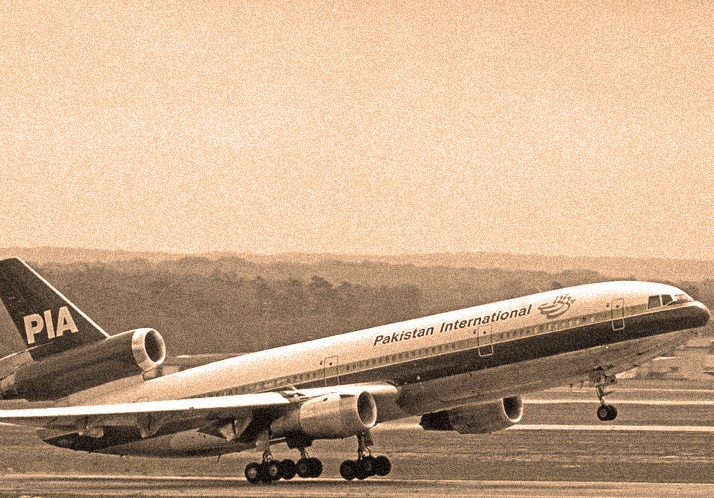
On board was an assortment of bearded-and-scarfed travelers who had stern eyes and a tight clutch on their assortment of carry-on belongings. They didn’t bring conventional vinyl luggage with metal hinges, nor backpacks, but tied-up, cumbersome bundles wrapped in muslin, flimsy shopping totes, overstuffed carpet bags and a few rather subdued small animals in cages. Nobody gave any of the carry-ons notice, least of all the flight crew.
A large component of the passengers were clothed in formal attire, many of the men wearing waistcoats and decorative feathers on short turbans, pinned with gemmed brooches, as if part of a provincial entourage or wedding party. Others of the group wore the more common kufu head caps, but all were dressed in some nicer form of Pakistani kurta, the women extra-decorated with silk scarves and intricately embroidered ensembles. The colorful fliers were a study in contrast, appearing to be either a societal elite or special, infrequent-fliers onboard for a unique occasion—ready to soar above the dirt-poor nation below.



The formal group had materialized at dawn. A more common collection of Pakistanis had waited with me for most of the early morning hours, outside the PIA departure gates in the orangey haze of Karachi’s soupy winter smog. “Waited with me” wasn’t quite accurate, however: as we sat on the ground, they stared at me, into me, as if beholding the first westerner they’d ever seen—as they might have regarded a leper. Most of the men wore the Kameez and pakol hats or a simpler style of kurta. It made me feel underdressed in my blue jeans and tennis shoes.

The late-night Air India flight hadn’t really “connected” as planned. Its Pakistani International Airlines counterpart simply hadn’t been there as it was supposed to. Despite the unscheduled change, and the travel-trauma on many of the tight-scheduled travelers, the airport authorities had curtly shuffled all the nighttime passengers outside, then locked their doors and left, leaving us “connectors” to sit on the seat-less concrete apron fronting the check-in area. We shared the ground with scurrying beetles and cockroaches under buzzing overhead halogens until dawn.
The dusty Karachi Airport looked rundown and outdated. Prospective passengers waiting for other flights squatted in small knots, some on blankets, amid the swarming nighttime insects and occasional scurrying rodents. Humans, rodents and insects shared the moment. In place of the aroma of Indian incense was the pervasive odor of heavy tobacco and dust. I could taste the grit of Karachi in my teeth.
Together, everyone sat and lay quietly, nodding off intermittently in the cool December night air, periodically jolting awake each time a bug or gnat flew into their respective noses or ears. Time seemed to have stopped. The morning light eventually gathered, but only imperceptibly.
Finally dawn had come. The PIA employees returned and unlocked their doors, scrutinized tickets, checked baggage, and then the sub-continental crowd—with one westerner—toted their things out onto the tarmac and up a mobile stairway stationed before the jet.
“Made it!” I had thought, as I entered the airliner. The relief ended when heavy Middle Eastern tobacco smoke drifted through the cabin, choking all who weren’t drawing on the end of a dark unfiltered cigarette. The second-hand, skin-prickling nicotine high would last for the entirety of the trip.
Before takeoff, the cabin crew politely directed the passengers where to stow their carry-on luggage: the instructions were ignored. Luggage was jammed everywhere, above and below seats, over windows, and on laps, leaving obstacles for anyone seeking to move up or down the aisles. Passengers were next directed where to sit: this incited thirty minutes of repositioning and contentious vocal challenges concerning seating assignments. Lastly the crew directed passengers to fasten their seatbelts: again, instructions were ignored. Only a few locking clicks could be heard from the metal clasps.
*
The suffocating flight was otherwise unremarkable until the jet neared the Islamabad airport. As it descended and made its final approach—still a good five hundred feet above the ground—an overhead bin suddenly banged open and dropped its contents to the floor. Apparently its latch failed in the mild turbulence. As if this was a signal to disembark, the better dressed group of passengers all jumped out of their seats and began gathering up their belongings for arrival. Had anyone been looking out the windows? Had they flown on a more sophisticated aircraft with automatically-opening overhead bins? It was a mystery. There were no “CLICK” noises of unfastened seatbelts because nobody had them fastened.
More bins were opened by the same group and luggage rained down from above. Other things were pulled out from underneath the seats. The aisle became wholly impassable. The smart looking group perhaps thought that the jet was on the ground. It wasn’t.
The sudden movement of passengers seemed to coincide with the jet bumping and dipping in its near-earth approach, which jostled everyone to and fro. Older members of the same group grabbed frantically at seats, not to fall, while clutching belongings. The cabin attendants promptly unbuckled themselves, jumped up and came down the aisle demanding that passengers take their seats. They admonished in English and Urdu, but their commands were ignored. It would take more than words.
The contrary group of passengers only retook their seats when the attendants desperately pushed and shoved them back into their respective places, taking luggage out of their hands in the process and re-stowing it. We were still more than 100 feet above the earth and jostling about in turbulent air. As a brief calm pervaded the cabin once more, the clucking sound of a chicken and the yap of a puppy could be heard over the engine noise. What kind of flight was this?
Seconds after everyone was reseated the jet touched down on the Islamabad runway with a hard bounce and the screech of brakes. Several overhead bins then opened in unison and, as before, dropped their contents to the aisle. As before, everyone immediately rose—not just the elite looking group but everyone—and commenced the unloading process. The destroyers of order and protocol took control of their debarking in a confusion of standing, sorting, arguing, packing and ignoring orders, while we hurtled and bounced down the runway at breakneck speed, slamming over runway bumps, still not yet solidly in contact with the earth.
Exasperated, the flight attendants tried again to subdue the exodus—since there was not yet anywhere to actually exit. They yelled. They waved their arms. They pushed back on the advancing mob. It was all for naught.
As the jet braked and the reverse thrusters roared, the flight attendants’ protests could not be heard. All but two of them sat back down in their seats and re-buckled themselves. As for the remaining two, their jaws moved but they were muted by the cacophony. There was no stopping any of the passengers from their mission.
By the time the aircraft had braked to a slightly-safer, freeway speed, all the passengers were standing in the aisle, holding his or her belongings, impatiently pushing forward, and poised to barge out when the exterior door might be opened. They would stand there for another fifteen minutes as the aircraft taxied, waited in queue, found its parking place and shut down. By then the flight attendants had long since given up.
In that manner, I arrived in Islamabad, the Capital of Pakistan. Would this place be as chaotic as India had been? Was the PIA flight an omen? I wondered. Soon, picking my way through a busy intersection of Rawalpindi, I would know.
